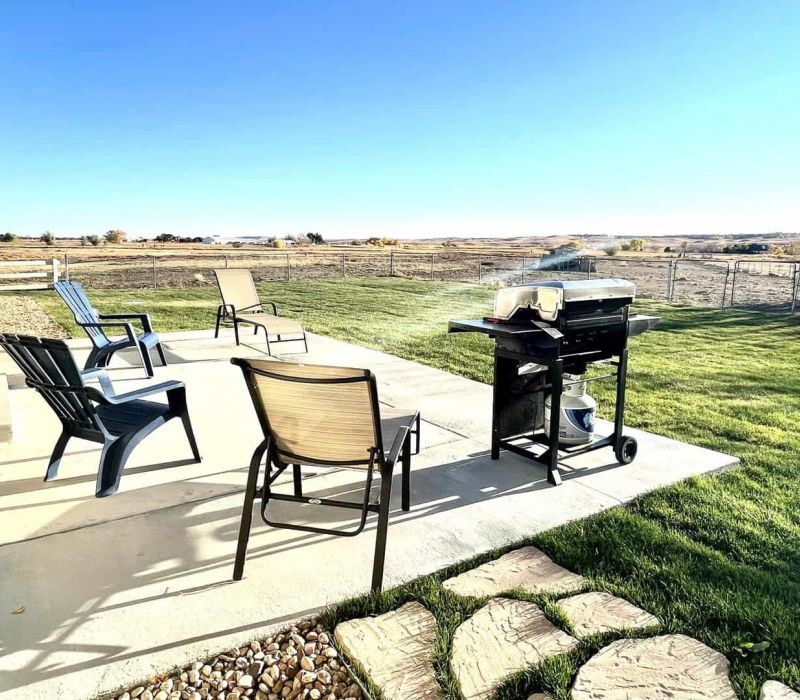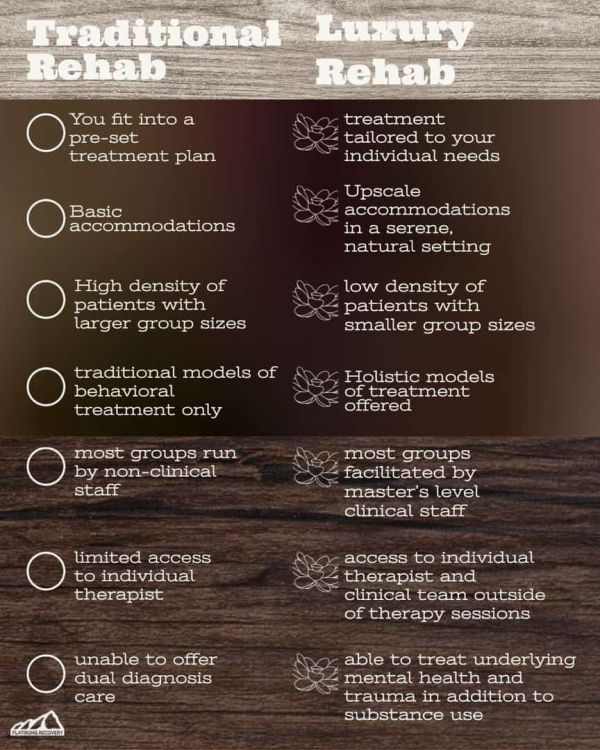Luxury Rehab
What Is Luxury Rehab? 

The Traditional Approach To Treatment

How Our Luxury Rehab Center Is Different
Luxury rehab centers try to offer a radically different experience than traditional treatment models for addiction. Here is a breakdown of some of the key differences in traditional rehab centers versus luxury rehab centers:
Key Components Of Luxury Rehab, Explained 
Small-Scale Setting
A luxury rehab center is likely to have 20 beds or less, and will therefore feel more like an intimate, boutique retreat than a large-scale facility. There are numerous benefits to addiction treatment in a smaller setting. Fewer clients mean smaller groups, where clients are likely to build greater bonds and trusting relationships with their peers. Smaller groups ensure that every client will have a chance to participate and that facilitators will get to know the individual needs of each. The staff-to-client ratio at a luxury rehab centers is extremely low, which gives each client the opportunity to have a team of support professionals collaborating to offer them the best care possible.
When the size of a program is smaller, this also gives clients the ability to access their individual therapist, case manager, and other staff when needed outside of scheduled sessions, and they will be able to have more of a say in creating a treatment plan that works for them. Boutique programs like Flatirons Recovery that limit their client census guide clients in taking advantage of the smaller community and closer peer bonds.

Highly Individualized Care
Due to the limited client census, luxury rehab centers are able to offer very individualized treatment based on what each individual needs. At Flatirons Recovery, group sizes average at 6-8 people, and our Recovery Ranch has only 9 beds, ensuring that our clients don’t get lost in the shuffle. Each client is assigned an individual therapist, psychiatrist, and case manager that insure their treatment is meeting their needs.
Most people who come to luxury treatment for substance use disorders have other issues, such as trauma, that they hope to address in order to make long-term recovery successful. When staff is working with a small number of clients, they are more able to custom tailor a person’s experience to include what they need on a more holistic level. Luxury rehab centers are predominantly staffed with master’s level clinicians who are highly skilled and trained in dual-diagnosis care. They are also much less likely to suffer from burnout and compassion fatigue from an unmanageable caseload, which can greatly affect treatment.
A Holistic, Integrative Approach To Addiction Recovery
While traditional behavior modification therapies and cognitive therapies, such as CBT, can be very helpful for managing some mental health symptoms, they do not work for everyone, and they do not address the underlying root of the symptom in the first place. These therapies work on changing thoughts and behaviors.
But when this doesn’t work, mindfulness-based interventions, such as Dialectical Behavioral Therapy (DBT), Acceptance and Commitment Therapy (ACT), and Mindfulness-Based Relapse Prevention help clients to tolerate difficult emotions and stress on a somatic level so that they can be more present and at peace in their lives. Flatirons Recovery has a unique curriculum custom tailored by Executive Director Mark Oberg, who is himself a clinician and long-term practitioner of meditation. Rather than being based solely in the 12-Step (AA) model of addiction recovery, most luxury rehab centers are considered “multi-pathways,” integrating various community recovery models so that each individual client can find a program and community that works for them.
In addition to mindfulness, a luxury rehab facility likely to include alternative medicine such as acupuncture, integrative psychiatry, nutrition, yoga, massage, reiki, and other healing modalities, as well as experiential treatment modalities such as music therapy, art therapy, nature, and adventure-based therapy, and equine therapy. Bringing in these different approaches to healing creates not only a more enjoyable and diverse healing experience, they also help clients to build lasting resources to maintain their recovery and enjoy a life of sobriety.
Finally, luxury rehab centers will be able to treat co-occurring diagnoses (dual-diagnosis care), meaning treating both addiction and underlying mental health issues together. This typically includes trauma treatment such as Eye Movement Desensitization and Reprocessing (EMDR), Brainspotting, TMS, Somatic Experiencing, and/or Neurofeedback.

Upscale, Boutique Accommodations
A luxury rehab facility is going to provide far nicer accommodations than a traditional inpatient center. Some luxury rehab centers may feel like a resort, while others have a more natural, retreat-like feel to them. Either way, some features of luxury rehab centers may include access to nature, beautiful views, private or semi-private rooms, access to a larger gym and/or pool, and fully updated facilities. Luxury rehab facilities will likely put great thought, care, and resources into creating an uplifting and serene setting to start the recovery journey, considering the space itself as contributing to a person’s healing.
Most will provide healthy, organic food, and some may even contain their own gardens for a farm-to-table experience. Luxury rehab centers will likely be more accommodating to dietary restrictions and individual nutritional needs. Meals at luxury treatment centers are likely to be influenced by professional nutritionists and/or dietitians with the unique nutritional needs of early recovery in mind.
Unique Luxury Rehab In Boulder, CO 
Flatirons Recovery offers a highly individualized, holistic experience of addiction recovery. Our luxury rehab facility sits on an 80-acre horse farm in beautiful Boulder County, Colorado and provides custom-tailored treatment to meet individual needs on a level unparalleled by the vast majority of treatment centers in the country. Our curriculum includes mindfulness-based interventions, experiential therapies, abundant time in nature, integrative psychiatry, acupuncture, yoga, nutrition, fitness, community-based programming, trauma therapy, family programming, and so much more.
For a free consultation to see if our addiction treatment is right for you or your loved one, contact us.